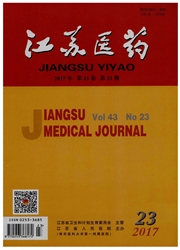

 中文摘要:
中文摘要:
目的:观察阿托伐他汀对心肌梗死患者的保护作用并探讨其可能的机制。方法:抽取我院2013年3月~2015年3月收治的急性心肌梗死(AMI)患者78例(标记为观察组)及行健康体检人员50例(标记为对照组)。采用随机双盲法将观察组患者分为常规组与治疗组各39例,常规组采取常规治疗,治疗组在常规组基础上加以阿托伐他汀口服,20 mg/次,治疗28 d,比较两组患者治疗前后血清炎症因子和血脂水平、心功能及不良事件的发生情况。结果:治疗前,观察组患者的血清IL-6、IL-8、CRP水平均明显高于对照组,差异有统计学意义(P〈0.05)。治疗后,治疗组血清IL-6、IL-8、CRP、TC、TG、LDL-C水平均明显低于常规组,LVEF、CO水平明显高于常规组,差异均有统计学意义(P〈0.05)。治疗28d,治疗组心律失常的发生率、死亡率分别为12.8%、2.6%,均显著低于常规组的38.5%、17.9%(P〈0.05)。结论:阿托伐他汀可有效改善急性心肌梗死患者的心功能,减少不良心血管事件,这可能与其降低血清IL-6、IL-8、CRP及血脂水平有关。
 英文摘要:
英文摘要:
Objective: To observe the protective effect of atorvastatin on patients with acute myocardial infarction and explore its possible mechanisms. Methods: 78 patients with acute myocardial infarction(AMI)(marked as the observation group) treated in our hospital from March 2013 to March 2015 and 50 cases who underwent health physical examination(marked as the control group) were selected. The observation group was divided into the routine group and the treatment group by using random double blind method, with 39 cases in each group. The routine group was treated by routine therapy. Based on this, the treatment group was treated with oral atorvastatin, 20mg/times and the treatment lasted for 28 d. The serum inflammatory factors, blood lipid levels, cardiac function and the incidence of adverse events were compared between two groups before and after the treatment. Results: Before treatment, the levels of serum IL-6,IL-8 and CRP in the observation group were significantly higher than those in the control group(P〈0.05). After treatment, the levels of serum IL-6, IL-8 and CRP, TC, TG and LDL-C in the treatment group were significantly lower than those in the control group. LVEF and CO levels were significantly higher than those in the control group(P〈0.05). On the 28 th day after treatment, the incidence rates of arrhythmia and mortality in the treatment group(12.8%, 2.6%) were significantly lower than those in the routine group(38.5%, 17.9%)(P〈0.05). Conclusion: Atorvastatin could effectively improve the cardiac function of patients with acute myocardial infarction, reduce the adverse cardiovascular events, which might be related to the decrease od levels of serum IL-6, IL-8, CRP and blood lipid.
 同期刊论文项目
同期刊论文项目
 同项目期刊论文
同项目期刊论文
 期刊信息
期刊信息
